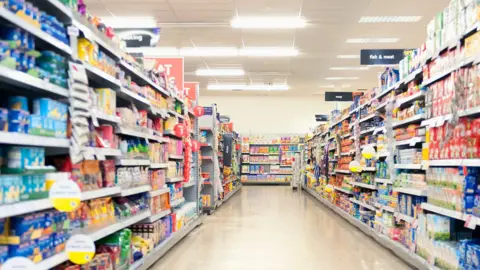Supermarkets 'still facing sea border problems'
 Getty Images
Getty ImagesMajor supermarkets are still experiencing "sustained practical difficulties" with the Windsor Framework, MPs have been told.
The NI Retail Consortium (NIRC), which represents the retailers, made the comment in its submission to an inquiry being held by the NI Affairs Committee.
The framework is Northern Ireland's post-Brexit deal which covers trade and human rights.
It is an amended version of Northern Ireland's original Brexit deal, the protocol.
The protocol created a trade border between Great Britain and Northern Ireland as the way to prevent a hard border between Northern Ireland and the Republic of Ireland.
That meant a major headache for supermarkets as their Northern Ireland stores are largely supplied from GB distribution centres.
The framework's major difference from the protocol is that it permits food products being sold in Northern Ireland to be made to UK standards, rather than EU standards.
It also created the NI Retail Movement Scheme (NIRMS), a trusted trader scheme allowing food products to move from GB to Northern Ireland with minimal paperwork and few routine checks.
'Additional delays'
However the NIRC said: "The simple system for operating NIRMS has become more complicated over the years of its use."
It added that during 2024 the percentage of vehicles being physically checked had increased leading to "additional delays and, occasionally, the rejection of lorries impacting on retail operations".
It said the IT system for validating paperwork had deteriorated in recent months and now takes at least 30 minutes to process each submission which has "generated inefficiencies within supply chains".
The NIRC has also questioned whether the next major phase of the framework can be implemented on its planned timetable.
New process for parcels
 Getty Images
Getty ImagesNew processes for parcels being sent from businesses in GB are due to come into effect at the end of March.
Parcel carriers will have to be signed up to a trusted trader scheme and business-to-business parcels will face customs processes for the first time.
The NIRC said it was concerned that "parcel carriers including Royal Mail, may not be geared up for the introduction of the new requirements".
It added that it was worried about "the level of disruption that may occur if the deadline of 31 March 2025 is kept in place".
More guidance on changes
A government spokesperson said: "The government is committed to the full and faithful implementation of the Windsor Framework as the only credible and sustainable solution for Northern Ireland, ensuring smooth trade and the avoidance of a hard border."
It is understood the government will shortly set out more guidance on the changes coming in March.
Meanwhile the Times newspaper has suggested the government would be prepared to strike a new deal with the EU which would involve the UK following EU rules on food and agriculture.
That sort of deal would radically reduce the checks and controls required on goods moving from GB to NI but would be controversial.
Conservative peer and former Brexit negotiator Lord Frost said such a move would amount to "selling out this country's self-government to a foreign court".
The government has not commented on the story.
It has previously set out ambitions for an agrifood deal which could reduce trade frictions and support the smooth movement of goods between GB and NI.
